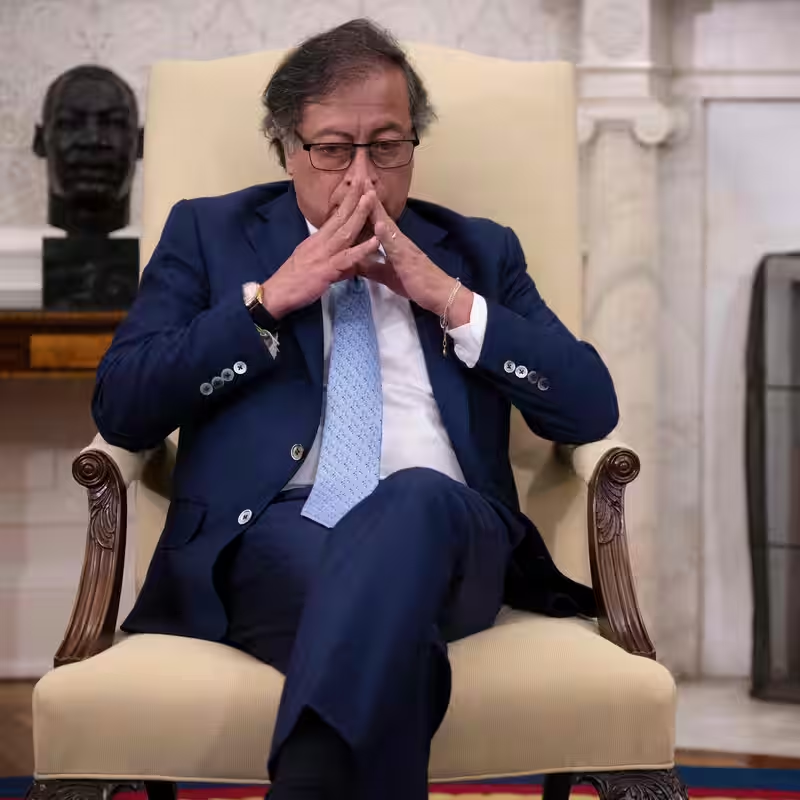U.S. Sanctions Colombia’s President Gustavo Petro Over Drug Allegations
In a dramatic escalation of diplomatic tensions, the United States has imposed sweeping economic sanctions on Colombian President Gustavo Petro, accusing him of enabling drug trafficking networks to flourish under his administration. The move, announced Friday by the U.S. Treasury Department, also targets Petro’s wife, their son, and Colombia’s Interior Minister—marking one of the most aggressive actions Washington has taken against a sitting Latin American head of state in decades.
Why the U.S. Targeted Gustavo Petro
The Treasury Department alleges that President Gustavo Petro has repeatedly failed to curb cocaine production and has allowed known narcotics traffickers to operate with impunity. According to official statements, his policies—particularly the suspension of aerial fumigation and reduced cooperation with U.S. anti-narcotics agencies—have created a permissive environment for drug cartels.
“Under President Petro’s leadership, Colombia has become a haven for drug traffickers who threaten regional stability and fuel the opioid crisis in the United States,” said a Treasury spokesperson.
A Political Flashpoint
The sanctions come amid heightened friction between Bogotá and Washington. Petro, a former guerrilla and Colombia’s first leftist president, has been one of former President Donald Trump’s most vocal critics in the region. He recently condemned U.S. military operations in the Caribbean, calling them “neo-colonial interventions.”
Analysts suggest the timing of the sanctions is not coincidental. With Trump campaigning for a potential 2028 presidential run, the move may also serve as a warning to other leaders who challenge U.S. foreign policy.
Who Else Was Sanctioned?
The Treasury’s Office of Foreign Assets Control (OFAC) named four individuals in total:
- Gustavo Petro – President of Colombia
- Verónica Alcocer – First Lady and Petro’s wife
- Nicolás Petro – The president’s son (previously implicated in a separate corruption probe)
- Armando Benedetti – Interior Minister and longtime Petro ally
All U.S.-based assets belonging to these individuals are now frozen, and American citizens and companies are prohibited from conducting business with them.
Colombia’s Response
President Petro condemned the sanctions as “an act of imperial aggression” and accused the U.S. of using the drug war as a pretext to punish political dissent.
“They don’t sanction dictators—they sanction democrats who speak truth to power,” Petro said in a fiery address from Bogotá. He vowed to file a complaint with the United Nations and seek support from regional allies like Brazil and Mexico.
Domestically, the move has polarized opinion. Supporters see it as proof of Petro’s anti-imperialist stance, while critics argue his drug policy has backfired, with coca cultivation reaching record highs in 2024.
Historical Context: U.S.-Colombia Drug Relations
For over two decades, Colombia was the centerpiece of U.S. counternarcotics strategy in Latin America. Programs like Plan Colombia poured billions into military aid and crop eradication.
Petro’s election in 2022 marked a sharp departure. He halted glyphosate spraying, halted extraditions of certain traffickers, and pushed for voluntary crop substitution—policies U.S. officials now say have emboldened criminal syndicates.
According to the United Nations Office on Drugs and Crime (UNODC), Colombia produced an estimated 1,700 metric tons of cocaine in 2024—the highest on record.
What Comes Next?
The sanctions could severely limit Petro’s ability to access international financial systems and may deter foreign investment. However, they also risk rallying nationalist sentiment around his government.
Observers warn the situation could destabilize a key U.S. ally in a region increasingly influenced by China and Russia.
Sources
The New York Times: U.S. Imposes Sanctions on Colombia’s Leader




